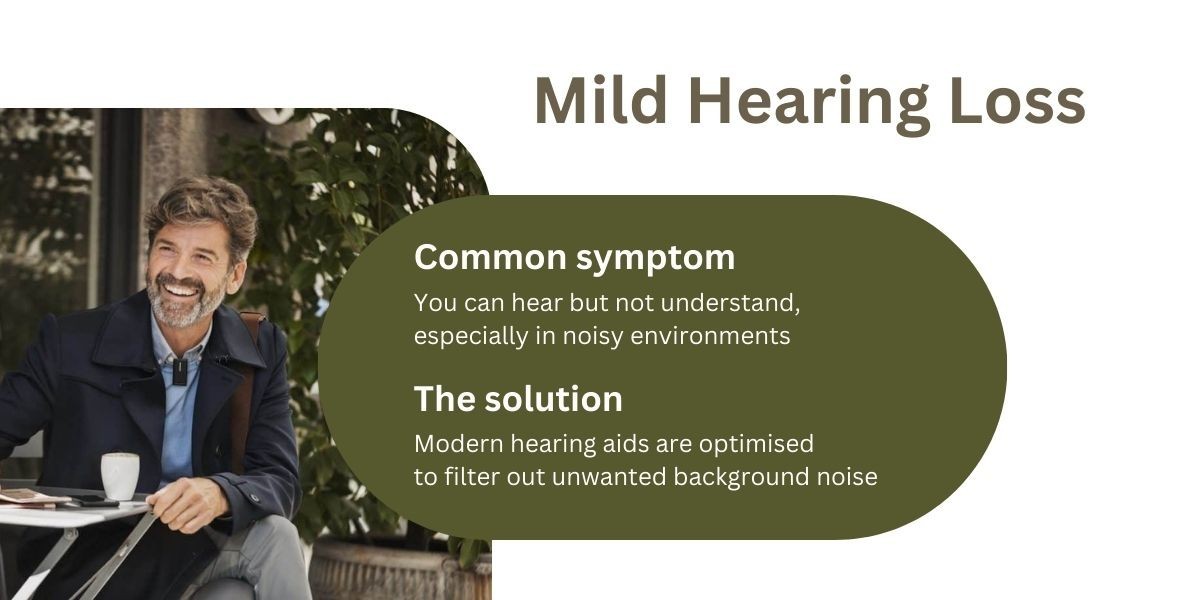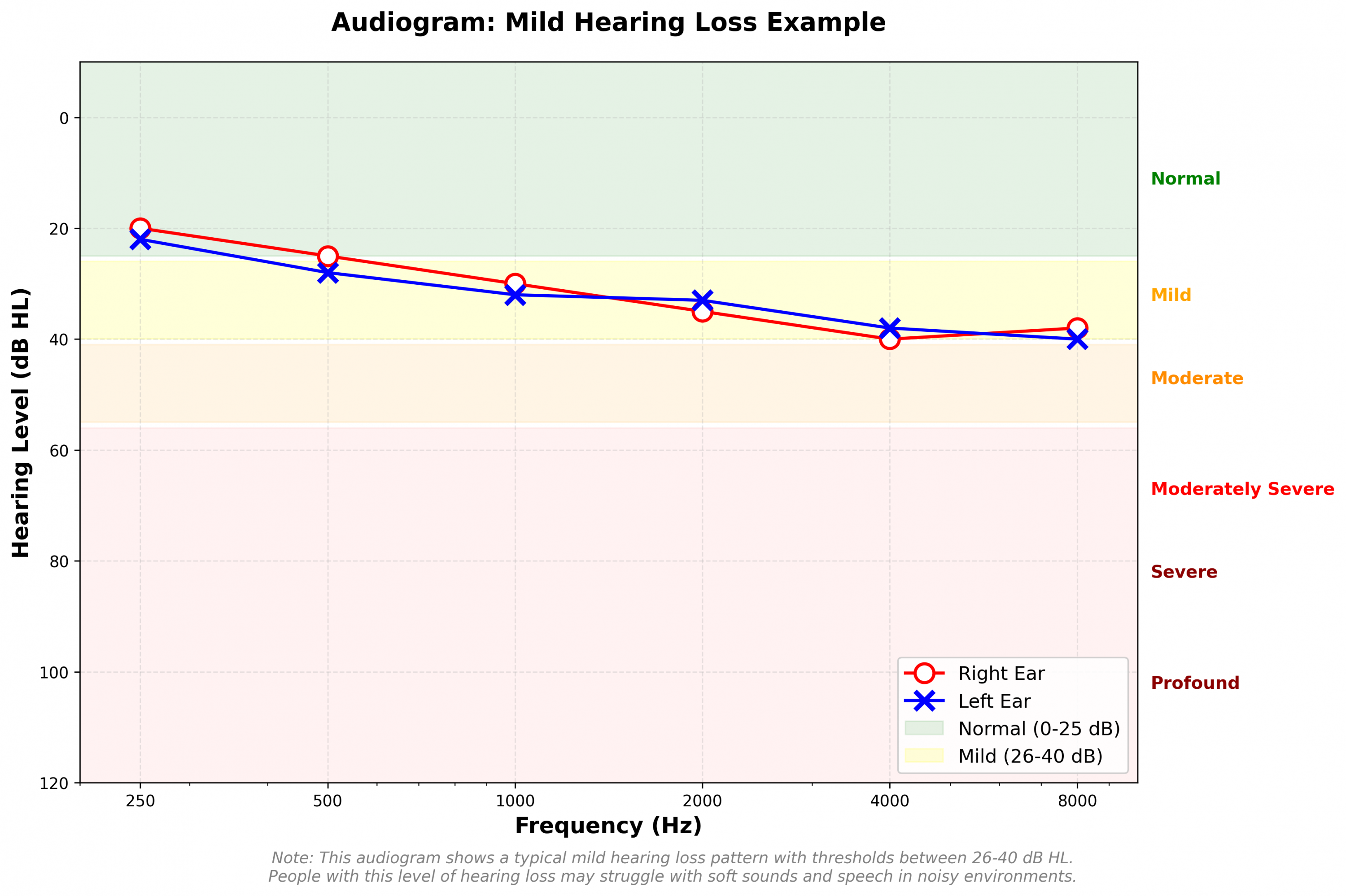
Head of Online Medical Content

Audiology Expert

What is Mild Hearing Loss?
Why mild hearing loss isn't harmless and shouldn't be ignored
Overview | Symptoms | Causes | How does it affect you? | Treatments | Can you prevent it? | Diagnosis | Can it be corrected? | Mild vs moderate | Key takeaways and next measures | Conclusion
| Hearing Aid UK 19/01/2026 Update |
Understanding mild hearing loss
Mild hearing loss involves difficulty hearing soft sounds and understanding speech in noisy environments. It typically affects hearing thresholds between 26 and 40 decibels. Common causes include ageing, noise exposure, and ear infections.
Hearing Aid UK has discovered research that shows approximately 1 in 6 adults in the UK live with some degree of hearing loss, with mild hearing loss being the most prevalent form.
Despite its commonality, studies indicate that people wait an average of 7-10 years before seeking help after first noticing symptoms.
So, if you’ve ever struggled to follow a conversation in a busy café or found yourself constantly turning up the TV while others seem fine, mild hearing loss could be the culprit.
In this article, we explore the causes, effects, and available treatment options for mild hearing loss, which we hope will shed light on this often-overlooked level of hearing loss.
Fake it until you make it
Hearing loss is separated into levels of severity, from mild to profound. If you have mild hearing loss, your loss is not classed as severe, which means that you may be inclined to take on the “fake it until you make it” approach.
Here lies the danger, because the loss is mild, it can be more subtle than obvious. Thus making it easier to disregard.
It’s not uncommon for people to agree silently in meetings, hoping they’ve caught enough of the conversation to stay on track. Over time, this method can result in embarrassing misunderstandings, missed opportunities, or strained social interactions.
Many people build coping mechanisms without realising it: they might avoid certain social situations, position themselves tactically in rooms to hear better, or rely heavily on lip-reading.
Whilst these approaches can assist in the short term, they commonly hide the underlying problem and prevent people from seeking proper treatment.
Listening fatigue comes into play
The "listening fatigue" associated with mild hearing loss is often underestimated. When your brain has to work harder to fill in the gaps and decode muffled speech, it becomes mentally exhausting.
You might find yourself feeling drained after social events or meetings, not because the activities themselves were tiring, but because the effort required to hear and process conversation was so intense.
What many don’t realise is that untreated mild hearing loss may result in cognitive decline. Studies have linked even mild hearing loss to an increased risk of dementia, as the brain works harder to process sounds, leaving fewer cognitive resources for memory and thinking.
The social isolation that often accompanies hearing difficulties can accelerate mental health issues like depression and anxiety.
Related reading: Hearing loss and dementia risk

What Are the Signs of Mild Hearing Loss
What is the mild hearing loss range?
What are the mild hearing loss symptoms?
Mild hearing loss is a relatively common auditory impairment that has a notable effect on a portion of the UK’s population. While it is not considered as severe as profound hearing loss, mild hearing loss can still have a noticeable impact on quality of life.
For example, it can be a barrier to communication at home and in the office, as well as affect overall health and well-being.
When we take a look at mild hearing impairment characteristics, it typically affects sounds that are quieter than 25 dB (decibels).
Those with mild hearing loss frequently have difficulty hearing soft or faraway sounds, as well as find it difficult to understand speech in noisy environments and during conversations on the phone.
You might notice you’re frequently asking others to repeat themselves or mishearing terms such as “fifteen” for “fifty” when booking an appointment or catching a train announcement.
So, what does mild hearing loss sound like?
If you have mild hearing loss, you may also struggle with high and low-frequency sounds. In fact, most people lose the ability to hear high-frequency sounds first.
Those with this level of hearing loss often complain that although they can hear conversations, they can’t actually fully understand them.
It’s somewhat like having the volume turned down on only certain parts of a sentence. You can hear the words are there, but picking out exactly what was said, especially when there’s background noise, can seem like attempting to tune a fuzzy radio station.
Is mild hearing loss normal? Yes, mild hearing loss can be considered within the range of normal variations in hearing ability. Many people experience mild hearing loss as they age or because of other factors like noise exposure or genetics.
While it may not greatly affect daily functioning for some, others may benefit from interventions and treatments such as hearing aids.
Related reading: Explore modern hearing aids
Mild hearing loss causes
There can be various causes of mild hearing loss, such as hereditary factors, exposure to loud noises, ageing (presbycusis), certain medications (ototoxicity), infections, and medical conditions like otosclerosis or Meniere's disease.
It is important to identify and address such causes, as some may be reversible or treatable.
The earlier the diagnosis, the higher the success rate for effective hearing healthcare treatment in the future.
Common scenarios include damage from years of using loud power tools, attending concerts without earplugs, or living in a noisy city centre where the din of traffic takes its toll over time.

The Effects of Mild Hearing Loss
Is mild hearing loss bad?
How does mild hearing loss affect the quality of life?
Mild hearing loss can greatly affect your ability to communicate and overall quality of life. It may lead to misinterpretations, increased effort to understand speech, social isolation, and resistance to attending social gatherings and enjoyable activities.
In social settings, those with mild hearing loss may struggle to follow conversations, which can lead to feeling frustrated, reduced confidence, and ultimately affect mental health.
In career settings, mild hearing loss can affect job performance, restrict communication with colleagues, and hinder career advancement.
The economic impact shouldn't be overlooked either. Research shows that people with hearing loss are paid on average £2,000 less per year than the general population in the UK, amounting to £4 billion in lost income nationally, as communication difficulties may limit career progression and workplace productivity.
It may add pressure to personal relationships, as communication slowly breaks down, resulting in confusion and strained interactions with family and friends.
For instance, a Sunday roast at the pub becomes more stressful than enjoyable when you’re constantly straining to hear the chat over rattling silverware and background noise.
Or you might find yourself avoiding phone calls altogether because you’re tired of asking people to repeat themselves.
Family members often notice the signs before the person with hearing loss does, like the TV volume creeping up week by week, or repeatedly asking "what?" during conversations.
These early observations from loved ones can play a key role in encouraging someone to seek assessment.
When I loved one has mild hearing loss
Noticing a loved one struggling with hearing loss can be challenging. Typical indicators include frequently asking “what?”, turning up the television volume, mishearing conversations, or withdrawing from social situations.
Many resist recognising the problem due to stigma, fear of seeming old, or believing it’s not “bad enough yet” for treatment.
They may have developed coping strategies, like lip-reading or avoiding noisy environments, that make them feel they're managing, not realising how much effort it's taking or how much they're missing.
Approaching your loved one requires compassion and timing. Choose a calm moment to raise concerns, making use of good examples: “I’ve noticed you’ve been asking me to repeat things. How does your hearing feel to you?”
Present it as a health issue, emphasising that untreated hearing loss can affect brain health and increase dementia risk.
Offer practical support like accompanying them to a free hearing test, but respect their decision. Meanwhile, make communication easier by facing them when speaking, reducing background noise, speaking clearly rather than louder, and showing patience. Your empathy and help can be the catalyst they need to seek help.
What are the treatments for mild hearing loss? Should I treat mild hearing loss? Can it be reversed?
Fortunately, there are several treatment options available for those with mild hearing loss. The most common and effective solution is hearing aids.
Modern hearing aids are technologically advanced devices that are able to increase sounds, improve speech comprehension, and personalise hearing.
They available in different types, including Behind-the-Ear (BTE), In-the-Ear (ITE), Receiver-in-Canal (RIC), and other types, offering options that suit preferences, needs, and hearing loss levels.
Many of today’s hearing aids are practically invisible and can even be controlled through your mobile phone. You could be adjusting settings for a crowded train platform without anyone noticing.
Beyond, other interventions can help assist in managing mild hearing loss:
- Auditory training apps and exercises can help retrain your brain to process sounds more effectively
- Communication techniques, such as positioning yourself to see speakers' faces and reducing background noise where possible
- Assistive listening devices for specific situations, like TV streamers that send audio directly to your hearing aids
- Regular hearing tests to monitor progression. Most audiologists recommend annual assessments once hearing loss is identified
It’s worth noting that while most mild hearing loss cannot be completely reversed, treating underlying causes like the accumulation of earwax or ear infections can restore hearing to normal levels in some cases.
Can you prevent mild hearing loss?
The most preventable type of hearing loss is noise-induced hearing loss (NIHL). This is a condition that influences millions in the UK. However, many types of hearing protective devices are available to help you keep your hearing safe from noise-induced hearing loss. These are:
- Foam earplugs: These earplugs are ideal for basic noise prevention.
- In-ear monitors: These are custom-made devices for musicians to protect their hearing and control the amount of sound they hear from each instrument.
- Filtered earplugs: These are great for music lovers who want to enjoy a concert without affecting the fidelity of sound.
- Percussive filters: These are custom moulded for those who enjoy shooting sports.
Even mowing the lawn or using a noisy hoover can slowly chip away at your hearing, so it’s a good idea to pop in ear protection when needed.
Beyond hearing protection, habits and routines play a role in hearing health:
- Cardiovascular health: Maintaining good blood flow to the inner ear through regular exercise and a balanced diet supports hearing function
- Limiting ototoxic medications: Some antibiotics, chemotherapy drugs, and even high doses of aspirin can damage hearing. Always talk about possible side effects with your GP
- Handling chronic conditions: Diabetes and high blood pressure can affect hearing, so keeping these under control is beneficial
- The 60/60 rule for headphones: Listen at no more than 60% volume for no longer than 60 minutes at a time to protect your ears
Mild hearing loss diagnosis
How is mild hearing loss diagnosed? Diagnosing mild hearing loss typically entails a detailed hearing evaluation conducted by an audiologist. The procedure starts with a discussion of your medical history and any issues concerning hearing ability in general.
The audiologist will then perform a series of tests, such as pure-tone audiometry, where you listen to tones at various frequencies and volumes.
The results are plotted on an audiogram, which helps determine the degree and type of hearing loss. Speech audiometry may also be carried out to determine the ability to understand and repeat words.
Through these tests, an audiologist can accurately diagnose mild hearing loss and provide appropriate recommendations for management and treatment going forward.
Most hearing tests take less than an hour and are available on the NHS or privately at high street opticians and hearing clinics, or professional audiologists like us, supplying both clinic and home visits for free.
Related reading: Discover our home visits

Looking at mild hearing loss and hearing aids
What are the best hearing aids for mild hearing loss?
Can mild hearing loss be corrected?
There is good news: those who have mild hearing loss are generally great candidates for hearing aids. Hearing aid technology is more advanced than ever, aesthetically subtle, and supports all degrees of hearing loss.
Even though mild hearing loss is not as severe as profound hearing loss, it is still significant.
This is why recognising and recognising the indicators of mild hearing loss is important. Seeking early diagnosis and exploring appropriate treatment choices can increase the effectiveness of how mild hearing loss is managed.
With progress in hearing aid technology, people with mild hearing loss can regain their ability to engage in conversations, improve their quality of life, and enjoy a more fulfilling listening experience. It’s not only about hearing better, but it’s about reconnecting with the world around you.
Mild vs moderate hearing loss: A quick comparison
| Mild hearing loss | Moderate hearing loss | |
| Decibel range | 26-40 dB | 41-55 dB |
| What you might miss | Whispers, soft speech, bird song | Normal conversation, doorbells, phone ringing |
| In quiet settings | Understand speech fairly well | Need people to speak louder |
| In noisy places | Struggle to follow conversations | Very difficult to understand speech |
| Daily impact | Occasional frustrations in groups | Significant communication difficulties |
| Hearing aids | Helpful | Strongly recommended |
Key takeaways and future measures
- Mild hearing loss (26-40 decibels) is common but significant, affecting 1 in 6 UK adults, making it hard to hear in noisy places like restaurants and cafés
- Don't wait – people delay 7-10 years on average before seeking help, but early treatment protects your brain health and reduces dementia risk
- Common signs are constantly asking people to repeat themselves, turning up the TV volume, struggling with phone calls, and feeling exhausted after social gatherings
- Untreated hearing loss costs you – up to £12,000 annually in lost earnings, plus strained relationships and increased social isolation
- Modern hearing aids are discreet and effective – practically invisible, smartphone-controlled, and available free on the NHS or privately
- Get a free hearing test today – quick (under an hour), painless, and the first step to regaining contact with the world around you
Conclusion
Mild hearing loss may seem manageable at first, something you can work around or ignore for a bit longer. But as we've explored, even mild hearing loss deserves your attention. It's not about the severity of the loss; it's about the quality of life you deserve.
Whether it’s connecting with beloved ones over a noisy Sunday lunch, feeling confident in work meetings, or merely enjoying the birds singing on your morning walk, better hearing creates possibilities that hearing loss quietly closes.
The good news? You’re living in a time when hearing solutions are more advanced, discreet, and more reachable than ever before. From NHS services to state-of-the-art private options, help is available, and it works.
Don’t wait the average 7-10 years that most people do. Your hearing health matters today, not just when it becomes severe. Book a hearing assessment, explore your options, and take that first step towards hearing and living better.
Why Choose Us?
- FREE Hearing Tests
- Best Hearing Aids and Prices
- FREE Aftercare for Life
- FREE Home Visits
- 200+ Local Audiologists
- 60 Day Money Back Guarantee
Should mild hearing loss be treated?
Recognising and noticing the clues of mild hearing loss is important
Seeking early diagnosis and exploring appropriate treatment approaches can increase the effectiveness of how mild hearing loss is managed.
If you suspect you or a loved one may have mild hearing loss, consulting with an audiologist is the first step toward better hearing health. Call us free on 0800 567 7621 to speak with one of our team.
Other hearing loss awareness articles you might like...
 Hearing aid stigma
Hearing aid stigma  The impact of diet on your hearing
The impact of diet on your hearing  How to tell if hearing loss is permanent or temporary
How to tell if hearing loss is permanent or temporary Watch Healthy Hearing's video on living with mild hearing loss below
Our specialist service includes:
Do not spend hundreds of pounds without getting a second opinion from us.
Please call us on 0800 567 7621
 Not only are the prices great, but the service is fantastic! Many thanks to your team.
Not only are the prices great, but the service is fantastic! Many thanks to your team.What's included in our hearing aid prices?
Hearing Aid UK's Top FAQs about mild hearing loss
Do I really need hearing aids for mild hearing loss?
Yes. Even mild hearing loss can lead to social isolation, cognitive decline, and increased dementia risk. Research shows people wait 7-10 years before seeking help, by which time communication has already suffered. If you're struggling in noisy environments or asking people to repeat themselves, hearing aids will significantly improve your quality of life.
Are invisible/discreet hearing aids available for mild hearing loss?
Absolutely. Completely-in-Canal (CIC) and Invisible-in-Canal (IIC) styles sit deep within the ear canal and are virtually undetectable. Receiver-in-Canal (RIC) models are also extremely discreet. Today's hearing aids are nothing like bulky older devices—they're sleek, sophisticated, and often mistaken for wireless earbuds.
How do I know if my hearing loss is mild or moderate?
Mild hearing loss is 26-40 decibels; moderate is 41-60 decibels. With mild loss, you manage one-on-one conversations in quiet but struggle in noisy environments. With moderate loss, you regularly ask for repetition even in quiet settings. The only definitive way to know is through a professional hearing test with an audiologist.
Is my hearing loss bad enough to need hearing aids?
If you're asking this question, the answer is likely yes. Even mild hearing loss impacts work, relationships, and wellbeing. Rather than "is it bad enough?", ask "would clearer hearing improve my life?" If you notice yourself struggling, even occasionally, it's worth exploring treatment options.
What questions should I ask my audiologist about mild hearing loss?
Ask: What type and severity is my hearing loss? What caused it? Will it worsen? Am I suitable for NHS or private hearing aids? Which styles suit my lifestyle? What's included in the price? How often should I recheck my hearing? What communication strategies can help? Can you demonstrate the devices before I commit?
How much will this cost me?
NHS hearing aids are free. Our private hearing aid prices, at Hearing Aid UK, start from £695 per aid.
Other pages you might find useful
Ask the Experts
6 Morton Lane
Walkwood
Redditch
Worcestershire
B97 5QA
Latest Launch
When we refer to a product as 'Latest Launch', we mean it is the latest to be released on the market.
New
When we refer to a product as 'New', we mean that the product is the newest hearing aid model on the market.
When we refer to a product as 'Superseded', we mean that there is a newer range available which replaces and improves on this product.
Older Model
When we refer to a product as an 'Older Model', we mean that it is has been superseded by at least two more recent hearing aid ranges.

